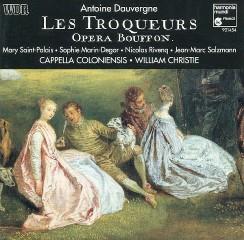Antoine Dauvergne - Les Troqueurs (Opera Bouffon) [1994]
Antoine Dauvergne - Les Troqueurs (Opera Bouffon) [1994]

Les Troqueurs, Intermède ["Opera Bouffon"], Paris, 1753 1 Ouverture: Presto - Andante - Presto 2 Scène 1 3 Scène 2 4 Scène 2 5 Scène 2 6 Scène 3 7 Scène 3 8 Scène 4 9 Scène 5 10 Scène 6 11 Scène 7 12 Scène 8 13 Ballet: Marche 14 Ballet: Andantino 15 Ballet: Largo 16 Ballet: Allegro 17 Ballet: Tambourin I 18 Ballet: Tambourin II 19 Ballet: Menuets I, II, III 20 Ballet: Contre-danse Concert De Simphonies A IV Parties, Op. 3 N°2 En FA Majeur 21 Ouverture. Grave - Presto - (Adagio) 22 Minuetto Gratioso 23 Minuetto Secondo 24 Andante 25 Andantino 26 Allegro I & II 27 Vivace I & II 28 Chaconne Jean-Marc Salzmann - Lucas (bass) Sophie Marin-Degor - Fanchon (soprano) Nicolas Rivenq - Lubin (baritone) Mary Saint-Palais - Margot (soprano) Cappella Coloniensis William Christie - conductor
This delightful trifle offers a fascinating glimpse of French opera in the declining years of the Baroque. It is not so much a homage to Italian taste as a near complete capitulation to it. The result is melodious, pacey and, with a nod to the French manner, distinctively orchestrated. This is an elegant performance, though not without blemish; the singing is well characterised and, on the whole, consistently pleasing. An enticing issue. -- Jan Smaczny, BBC Music Magazine
The opera-bouffon "Les Troqueurs" consists of the opera itself in one-act, followed by a "ballet" -- a suite of several dance movements. The liner notes discuss the opera at length, and give some insight into the historical context of the "war" between the Italian and French opera buffa styles of this period. There isn't any commentary on the ballet music, nor on the Concert de simphonies, Op. 3 No. 2, that makes up the last part of the disc.
The booklet contains the full libretto in the original French, with English and German translations. This is a delightful recording, with plenty of humor in the vocal performances. Another reviewer comments on the lack of a tenor in the cast (the two men are bass and baritone, not two basses as suggested) but this may be a device the composer chose to underscore the psychological and emotional divisions between the males and females that is at the heart of the opera. In any case, I didn't miss the middle voice. Dauvergne's melodic inventiveness is charming and well-suited to the themes. I thoroughly enjoyed this disc, and all the more since I had never listened to Dauvergne before. Try it, you'll like it! ---C. E. Hall, amazon.com
download (mp3 @320 kbs):
yandex mediafire ulozto gett bayfiles
Last Updated (Tuesday, 29 January 2019 16:08)








